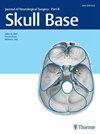迷走神经切除术可改善前庭分裂瘤患者的头晕症状
IF 0.9
4区 医学
Q3 Medicine
引用次数: 0
摘要
目的:头晕是与前庭裂孔瘤(VS)相关的最普遍、最令人衰弱的症状之一,而关于围手术期头晕的诱因或缓解因素的数据却很少。在本研究中,我们旨在评估在手术切除的同时进行前庭神经切断术或迷走神经切除术是否会改善术后头晕症状。方法:这是一项回顾性研究,研究对象是 2009 年至 2023 年期间在一家大型三级医疗中心接受切除术的连续系列 VS 患者。6个月后的头晕为主要终点,面神经和听力结果为次要终点。费雪精确检验用于识别分类变量之间的显著差异,多变量逻辑回归分析用于识别头晕以及面神经和听力结果的预测因素。结果我院共有333名患者接受了VS切除术。根据手术方式的不同,二元头晕报告无明显差异(P = 0.14)。然而,迷走神经切断术组患者在出院时(p < 0.01)、随访 6 个月(p = 0.02)和 1 年(p < 0.01)时报告的头晕症状明显减少。另一方面,接受保留迷宫方法的患者在手术后 1 年内头晕症状明显加重。结论:我们的数据表明,迷宫切除术可改善 VS 患者的头晕症状。选择性 VN 切除术似乎不会影响头晕或听力结果。最后,手术方法不会影响面神经的治疗效果。本文章由计算机程序翻译,如有差异,请以英文原文为准。
Labyrinthectomy improves dizziness in patients with vestibular schwannoma
Objective: Dizziness is one of the most prevalent and debilitating symptoms associated with vestibular schwannoma (VS) and there is little data on contributing or alleviating factors in the perioperative setting. In this study, we aimed to evaluate whether vestibular nerve sectioning or labyrinthectomy concomitant with surgical resection would improve dizziness in the postoperative period.
Methods: This is a retrospective study of a consecutive series of VS patients who underwent resection at a large tertiary care center between 2009 and 2023. Dizziness at 6-months was the primary endpoint while facial nerve and hearing outcomes were secondary endpoints. Fisher’s exact test was used to identify significant differences between categorical variables, and multivariate logistic regression analysis was performed to identify predictors of dizziness as well as facial nerve and hearing outcomes.
Results: A total of 333 patients underwent resection of VS at our institution. There was no significant difference in binary reported dizziness based on surgical approach (p = 0.14). However, patients reported significantly less dizziness at discharge (p < 0.01) as well as 6-month (p = 0.02) and 1-year (p < 0.01) follow-up in the translabyrinthine group. On the other hand, patients who underwent labyrinth-sparing approaches reported a significant increase in dizziness that remained up to 1 year from the time of surgery.
Conclusions: Our data suggests that labyrinthectomy may improve dizziness symptoms in patients with VS. Selective VN sectioning does not appear to affect dizziness or hearing outcomes. Finally, surgical approach does not affect facial nerve outcomes.
求助全文
通过发布文献求助,成功后即可免费获取论文全文。
去求助
来源期刊

Journal of Neurological Surgery Part B: Skull Base
CLINICAL NEUROLOGY-SURGERY
CiteScore
2.20
自引率
0.00%
发文量
516
期刊介绍:
The Journal of Neurological Surgery Part B: Skull Base (JNLS B) is a major publication from the world''s leading publisher in neurosurgery. JNLS B currently serves as the official organ of several national and international neurosurgery and skull base societies.
JNLS B is a peer-reviewed journal publishing original research, review articles, and technical notes covering all aspects of neurological surgery. The focus of JNLS B includes microsurgery as well as the latest minimally invasive techniques, such as stereotactic-guided surgery, endoscopy, and endovascular procedures. JNLS B is devoted to the techniques and procedures of skull base surgery.
 求助内容:
求助内容: 应助结果提醒方式:
应助结果提醒方式:


